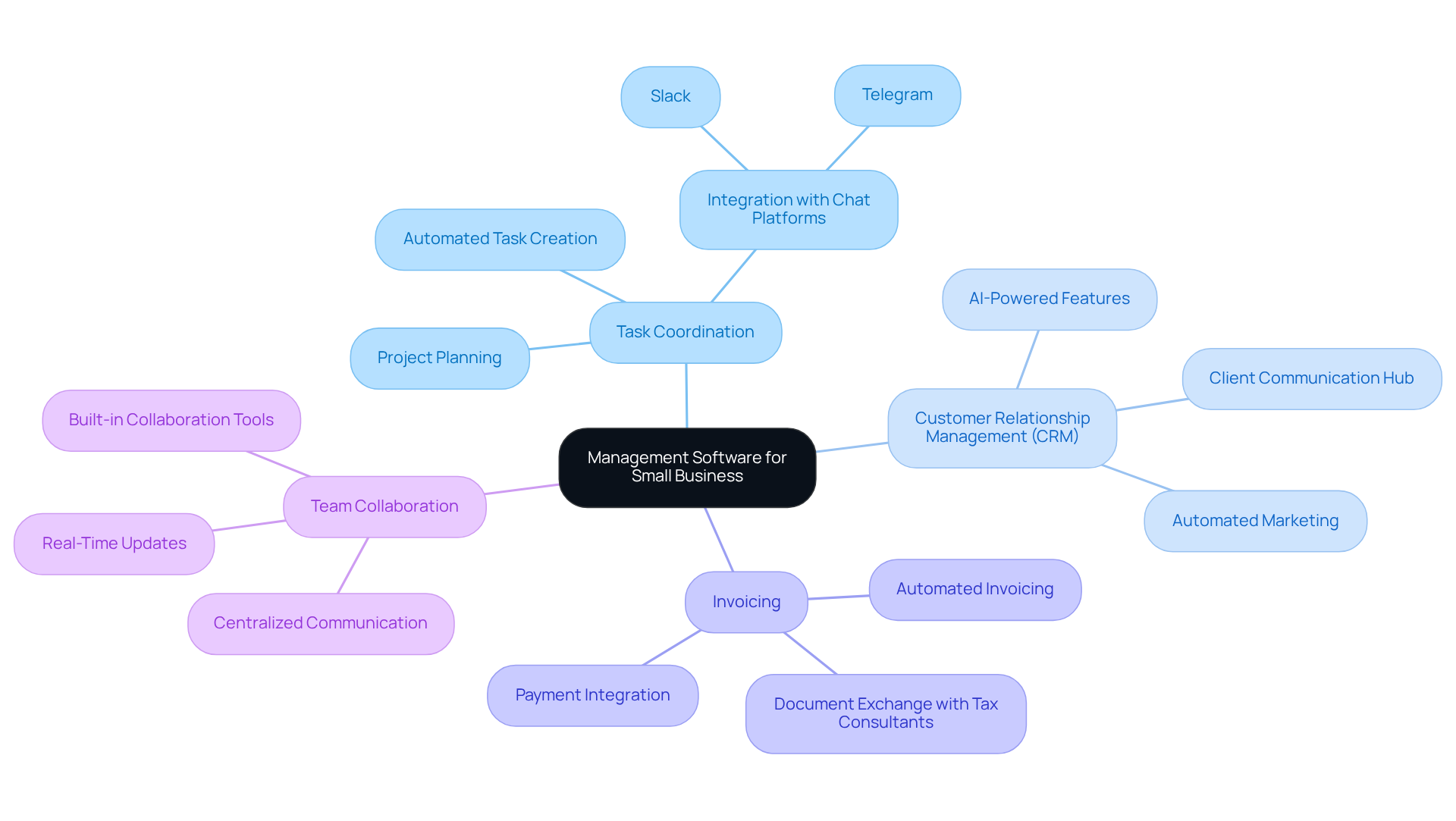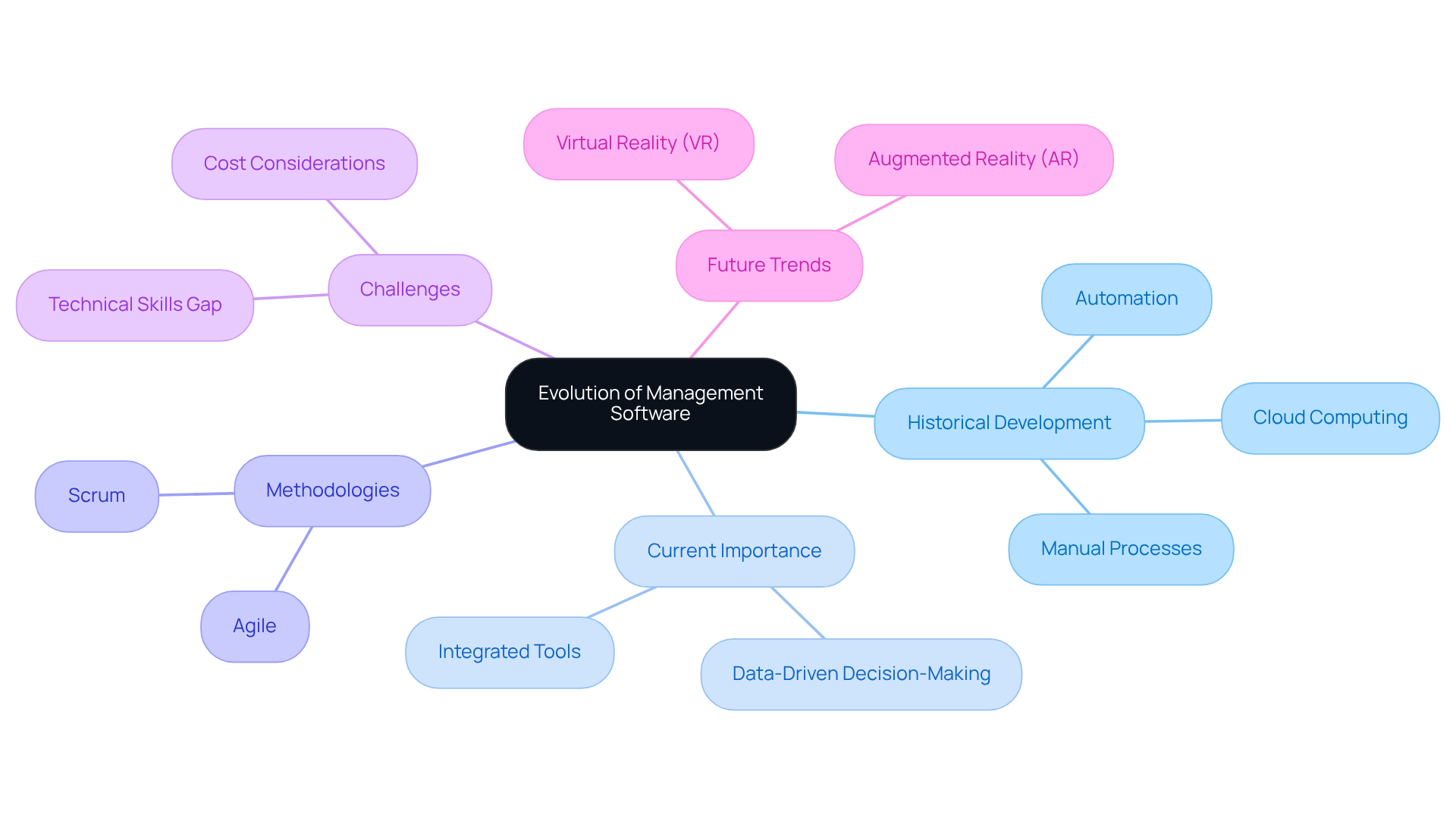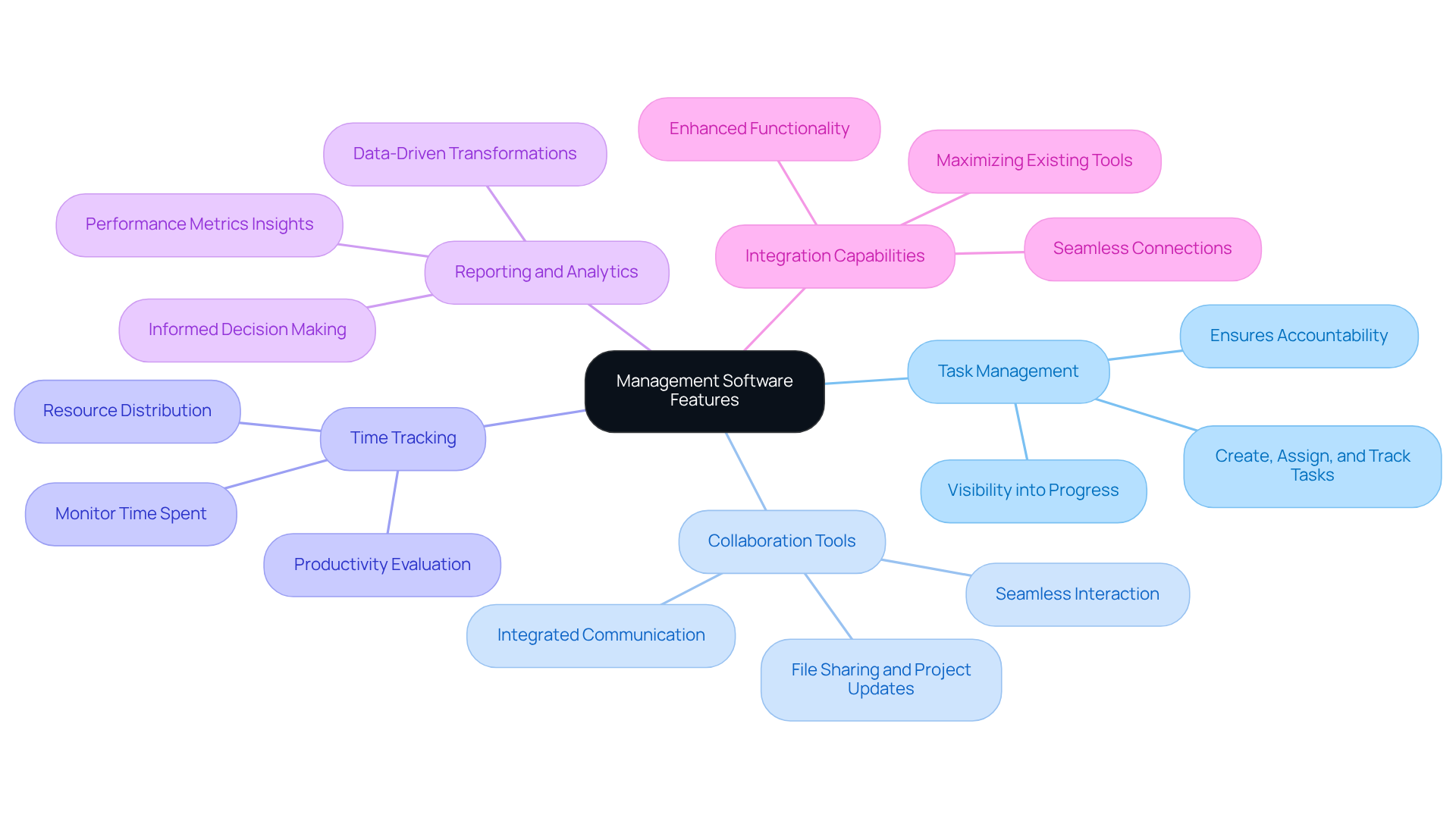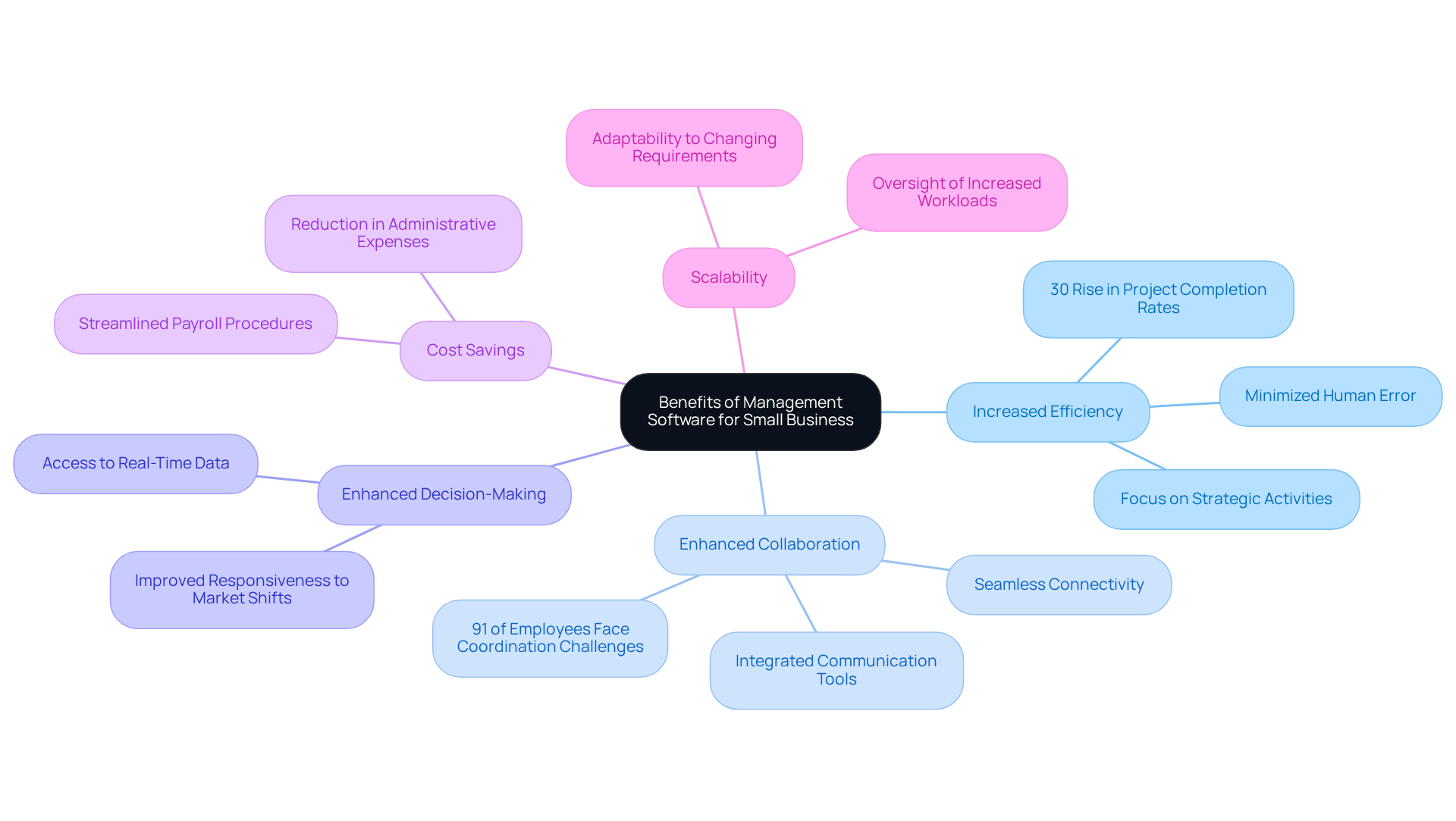Overview
Management software for small businesses is crafted to enhance operations, boost productivity, and facilitate project oversight through integrated features such as task management, CRM, and collaboration tools. This software not only automates routine tasks and streamlines workflows but also fosters improved communication and data-driven decision-making. For small enterprises striving to excel in a competitive environment, such tools are not just beneficial; they are essential.
Have you considered how much time your team spends on repetitive tasks? By automating these processes, management software can free up valuable resources, allowing your team to focus on strategic initiatives. Furthermore, the integration of various features ensures that all team members are aligned and informed, which is critical in today’s fast-paced market.
In conclusion, adopting management software is a strategic move that empowers small businesses to thrive. The right tools can transform operations, enhance collaboration, and ultimately lead to better outcomes in an increasingly competitive landscape.
Introduction
Management software has emerged as a pivotal tool for small businesses seeking to enhance operational efficiency and productivity. By integrating essential functionalities—such as task management, collaboration tools, and data analytics—into a single platform, these solutions empower teams to focus on growth rather than administrative burdens.
But as small enterprises navigate the complexities of adopting these technologies, a pressing question arises: how can they effectively leverage management software to overcome challenges and drive their business forward in an increasingly competitive landscape?
Defining Management Software for Small Business
Management software for small business encompasses a range of applications designed to enhance operations, boost productivity, and improve project oversight capabilities. These solutions seamlessly integrate essential features such as:
- Task coordination
- Customer relationship management (CRM)
- Invoicing
- Team collaboration
into a unified platform. Take Casy, for example; it automates task creation and updates by integrating with widely used chat platforms like Slack and Telegram. This integration allows teams to concentrate on their core activities, free from the burden of manual updates.
By employing built-in methodologies like OKRs and the Eisenhower Matrix, Casy empowers teams to prioritize their work effectively. Automating routine tasks and centralizing operational processes enable smaller enterprises to function more efficiently, directing their focus toward growth and innovation. The implementation of such applications not only streamlines workflows but also significantly alleviates administrative burdens, fostering an environment where teams can dedicate themselves to their primary objectives.
As a result, companies experience improved communication, reduced misunderstandings, and heightened overall productivity. This makes management software for small business an indispensable resource for small enterprises striving to thrive in a competitive landscape. Are you ready to transform your operations and drive your business forward?

The Evolution and Importance of Management Software
The development of administrative applications traces its roots to the early days of computing, when organizations relied heavily on manual processes for task coordination and record-keeping. As technology advanced, application solutions emerged, introducing automation and significantly enhancing efficiency. The advent of cloud computing further revolutionized administrative applications, enabling small enterprises to access management software for small business without the need for extensive IT infrastructure.
In 2025, management software for small business has become indispensable, offering integrated tools that improve collaboration, optimize workflows, and facilitate data-driven decision-making. Notably, 58.7% of IT spending remains traditional, underscoring the enduring relevance of cloud-based solutions.
Furthermore, the introduction of Agile and Scrum methodologies in the early 2000s has profoundly influenced the evolution of contemporary organizational tools, promoting adaptability and stakeholder engagement. However, small enterprises often face challenges in embracing new technologies, which can hinder their operations and growth.
Looking ahead, the anticipated rise in the utilization of virtual reality (VR) and augmented reality (AR) for project visualization is poised to shape the future of organizational tools. As Mailan Pham-Ada emphasizes, investing in management software for small business is crucial for sustaining high productivity and efficiency levels.

Key Features and Functionalities of Management Software
The essential key features of management software for small business are crucial for enhancing operational efficiency and team collaboration.
-
Task Management: This feature empowers users to create, assign, and track tasks, ensuring accountability and visibility into progress. How effectively are you managing your team's tasks?
-
Collaboration Tools: Integrated communication tools facilitate seamless interaction among team members through chat, file sharing, and project updates. Are your current tools fostering effective collaboration?
-
Time Tracking: Organizations can monitor the time spent on tasks and projects, aiding in resource distribution and productivity evaluation. What insights could accurate time tracking provide for your business?
-
Reporting and Analytics: This feature delivers valuable insights into performance metrics, enabling organizations to make informed decisions based on data. How could data-driven decisions transform your operations?
-
Integration Capabilities: Seamless connections with other tools and platforms enhance overall functionality and user experience. Are you maximizing the potential of your existing tools?
Together, these features empower small enterprises to streamline operations and foster team cooperation through management software for small business, ultimately driving success.

Benefits of Using Management Software for Small Business
The advantages of implementing management software for small businesses are extensive:
-
Increased Efficiency: Automating routine tasks not only saves time but also minimizes the risk of human error, allowing teams to focus on more strategic activities. For instance, a small marketing firm saw a 30% rise in project completion rates after implementing organizational tools, underscoring the tangible benefits of enhanced task monitoring and teamwork. Additionally, Casy, an innovative project coordination tool, has been shown to significantly lower administrative overhead, enabling teams to concentrate on their core activities.
-
Enhanced Collaboration: Integrated communication tools within administrative software foster teamwork, ensuring that all team members are aligned and informed. This seamless connectivity is crucial for maintaining productivity in fast-paced environments. A report indicates that 91 percent of employees state their company is encountering project coordination challenges, highlighting the necessity of effective collaboration tools.
-
Enhanced Decision-Making: Access to real-time data and analytics empowers owners to make informed choices swiftly, improving responsiveness to market shifts and operational challenges.
-
Cost Savings: Optimizing processes through organizational programs can lead to significant reductions in administrative expenses, allowing for the reallocation of resources to other vital sectors of the enterprise. Gusto, for instance, has received acclaim for streamlining payroll procedures, which can result in substantial cost reductions for smaller enterprises.
-
Scalability: As organizations grow, administration tools can seamlessly adjust to changing requirements, aiding in the oversight of increased workloads without sacrificing efficiency. This adaptability is essential for small enterprises striving for expansion while maintaining operational effectiveness.
In summary, the implementation of management software for small business not only boosts efficiency but also enhances collaboration, decision-making, and scalability, making it an invaluable asset.

Conclusion
Management software for small businesses is an essential tool that significantly enhances operational efficiency and fosters collaboration among teams. By integrating crucial features such as task management, CRM, invoicing, and team collaboration, these solutions empower small enterprises to streamline their processes and concentrate on growth. The value of these applications extends beyond merely automating routine tasks; they transform the overall work environment, enabling teams to prioritize their core objectives.
This article highlights several compelling arguments regarding the benefits of management software:
- Increased efficiency through automation
- Enhanced collaboration via integrated communication tools
- Improved decision-making with real-time data access
- Cost savings that facilitate resource reallocation
Moreover, scalability ensures that as businesses expand, their management tools can adapt to evolving needs without compromising performance. This comprehensive overview underscores the critical importance of investing in management software to thrive in a competitive landscape.
Ultimately, adopting management software is not merely a strategic move; it is a necessary step for small businesses striving to enhance productivity, improve communication, and make informed decisions. As technology continues to evolve, the potential for these tools to shape the future of small business operations is immense. Taking action to implement the right management software can lead to a more efficient, collaborative, and successful business environment.
Frequently Asked Questions
What is management software for small businesses?
Management software for small businesses refers to a variety of applications designed to enhance operations, boost productivity, and improve project oversight by integrating features like task coordination, customer relationship management (CRM), invoicing, and team collaboration into a single platform.
How does management software improve team collaboration?
Management software improves team collaboration by automating task creation and updates, allowing teams to focus on their core activities without the burden of manual updates. This is exemplified by tools like Casy, which integrate with chat platforms such as Slack and Telegram.
What methodologies does Casy employ to help teams prioritize their work?
Casy employs built-in methodologies like OKRs (Objectives and Key Results) and the Eisenhower Matrix to help teams prioritize their tasks effectively.
What are the benefits of automating routine tasks with management software?
Automating routine tasks allows smaller enterprises to function more efficiently, reducing administrative burdens and enabling teams to focus on growth and innovation.
How does management software impact communication within a company?
The implementation of management software improves communication, reduces misunderstandings, and heightens overall productivity, creating a more effective work environment.
Why is management software considered essential for small businesses?
Management software is considered essential for small businesses as it streamlines workflows, alleviates administrative burdens, and helps companies thrive in a competitive landscape by enhancing operational efficiency.




